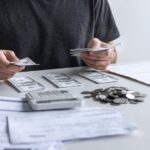You need to act quickly if you are behind in student loan payments. This is not just a worry feeling in your stomach. You could be subject to serious consequences if you fail to make enough payments. This could include damage to your credit rating, garnishment of your wages, being sued or the seizing of your tax refund.
Must Read: smallbusiness mortgage calculator attributes and positive aspects
Both federal and private loan servicers offer ways to assist borrowers in getting back on track. Assistance can also be provided by non-profit organizations. If none of these options work, then hiring an experienced attorney might be a good investment.
Income-Driven Repayment
There are many options if you cannot afford your monthly student loans payments right now, but you might be able to make a lower payment.
You might be eligible for income-driven repayment (IDR), if you have federal student loans. If your income is lower than your student loan debt, this plan may be a good option.
An IDR plan can pay as little as $0. You will need to recertify each year your income with the federal government. Your monthly payment will then be adjusted according to your income and family size.
If your loans are in default, IDR is not available. First, you’ll need to correct the default via loan rehabilitation or consolidation.
Never Miss: business loans your ideal credit score option
Deferment and forbearance
Forbearance and deferment are two options to temporarily suspend payments or reduce your federal student loan payments. Private lenders may offer either one or both with different rules.
Borrowers who have federal Perkins loans or subsidized federal loans are exempt from paying the interest during deferment.
However, forbearance does not prevent interest from accruing on federal student loans. Private lenders can decide how interest accrual is handled under forbearance or deferment.
Before your lender or loan servicer approves your request to defer or forbearance, they will ask you to fulfill certain conditions. For example, Federal student loan borrowers may be eligible to suspend payments if they are in serious financial hardship or are undergoing or recovering after cancer treatment.
Delinquency Default
Forbearance or deferment may be more advantageous than making your loans default. Your credit score can be affected if your loan servicer reports your late payments to the three major credit agencies. This will make it difficult to obtain credit, or any other form of credit that requires credit checks such as renting an apartment or applying for a job.
Even worse is going into default. There are different loan types, so the timing of default can vary. Federal Direct Loans and Federal Family Education Loans have a default period of 270 days. Private student loans default is usually triggered by missing a single payment.
Your loan agreement will outline the consequences of default. The entire amount can become due immediately. Your lender can sue and garnish your wages, among other consequences.
A Student Loan Problem?
Non-profit credit counseling organizations can help you create a plan to repay student loans and other debts. This assistance may require you to pay a fee.
Also Read: smallbusiness loan bail out
The National Foundation for Credit Counseling is a trusted place to look for assistance. A credit counselor can help you with your financial picture and not just student loan control.
When Federal Student Loans are in default?
You can either enter the federal student loan rehabilitation or use loan consolidation if your federal student loans have fallen into default.
- Loan Rehabilitation
You must make nine payments in a period of 10 months under the federal student loan rehabilitation program. Your loan servicer will determine the required payment based on your income.
Also, you will need to show proof of income and expenses. Federal Student Aid says that your monthly payments may be as low at $5 per month if you have a rehabilitation plan.
After your loan has been rehabilitated you can apply to deferment, forbearance or income-driven repayment. Although your credit report won’t show a default, it will still reflect late payments.
Most popular: beneficial prospects of small business loans
- Consolidation of Loans
Another option to get out of default is loan consolidation. To pay off your defaulted loan, you may be eligible for a federal Direct Consolidation Loan. If you are unable to pay your debts on time, you can set up an income-driven payment plan for the consolidation loan.


